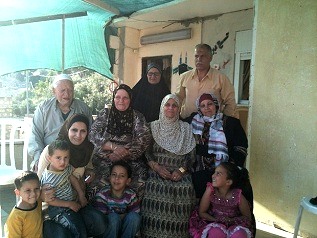BDS, Arab Land and the Custodian of Absentee Property
Photo: The Ruweidi family outside their home in Silwan May 9, 2012. - After two decades of legal struggle, the Ruweidi family from Silwan has been granted recognition by the courts that they are indeed the rightful owners of their home. The decision rejects the Jewish National Fund’s claim that the home is the property of the State of Israel. (Moriel Rothman/+972)
The 2005 call by more than 170 Palestinian organizations, both within Palestine and without, to boycott Israeli products and services, divest from companies that support and sustain Israel and sanction the Israeli state and its agencies is one of the most important and potentially one of the most effective strategies to end the injustices perpetrated against the Palestinian people as a result of the creation of a Zionist state and by Zionist actions even before.
Nothing in this article is intended to criticize or undermine BDS as a strategy. On the contrary, BDS should be encouraged and pursued as vigorously as possible. I am among those that believe that the only way to end the injustices is to end the state itself, but the participants in BDS need not agree about this in order to undertake BDS actions.
Recently, I and others have expressed concern about an apparently unauthorized change in the wording of the 2005 BDS call, posted on the BDS National Committee (BNC) website. This is also not a criticism of the strategy or of the movement, but rather of the actions of unknown parties that appear to have committed a breach of trust with the signatories of the 2005 call, by altering the wording of that call without consulting them.
Some have argued that the change of wording is insignificant and that the meaning remains unchanged. This is absurd. Why bother to change the wording if there is no change in meaning? That change in wording is important to someone. But to whom? And why? And by what protocol (if any) was the change made? Has this action been accountable in any way?




























